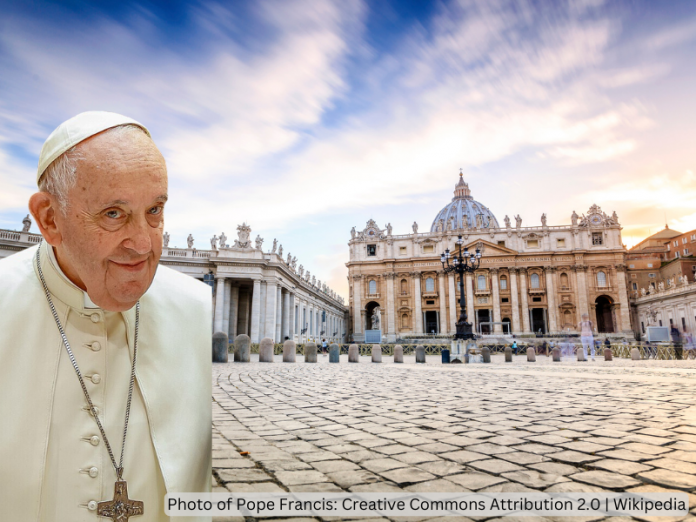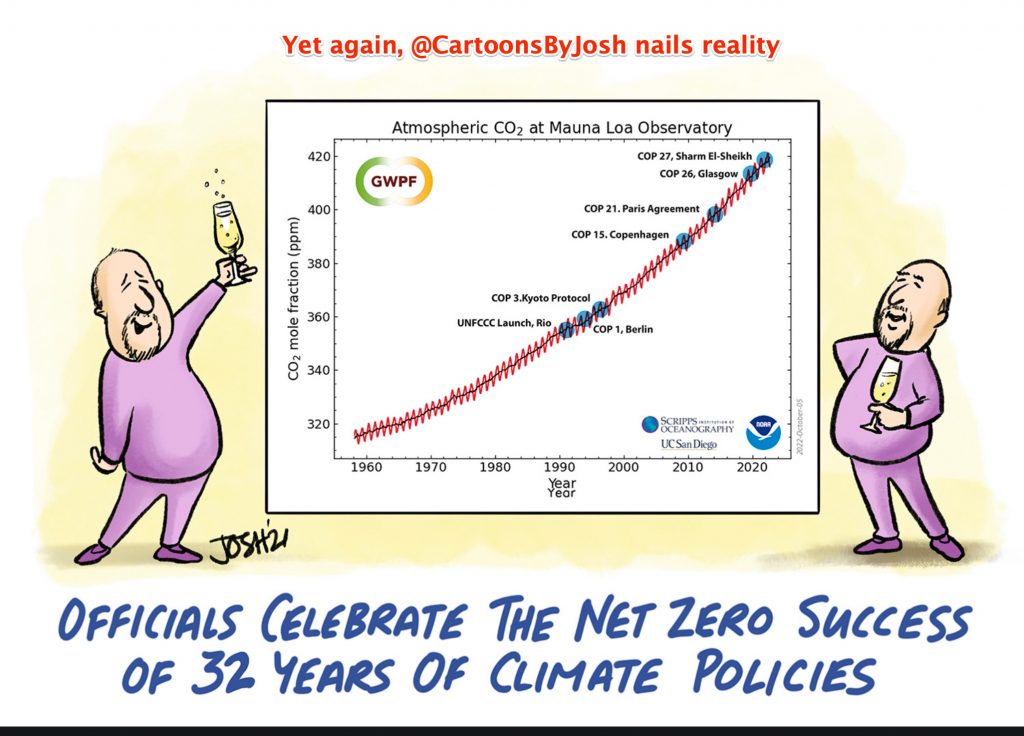YOU SHOULD SUBSCRIBE TO CLIMATE CHANGE WEEKLY.
IN THIS ISSUE:
- Pope’s Climate Harangue Shows that He Should Stick to Theology and Leave Climate Policy to Those Who Follow Facts
- Podcast of the Week: Green Breakdown: The Coming Renewable Energy Failure
- Cities’ Summer Temperatures Inflated Due to Urban Heat Island
- Video of the Week: Global Food Production vs. “Climate Catastrophe”
- Climate Comedy
- Recommended Sites
Miss Anything at Heartland’s Climate Conference? No Problem.

Pope’s Climate Harangue Shows that He Should Stick to Theology and Leave Climate Policy to Those Who Follow Facts
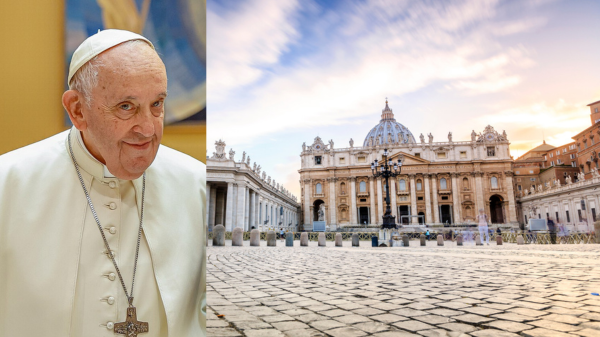
Editor’s Note: Pope Francis has made creation care and fighting climate change a cornerstone of his Papacy from its early days.
In late December 2014, the Vatican announced the Pope would be issuing an encyclical in 2015 concerning the need to battle climate change. In late April 2015, Francis hosted a one-day conference, “Protect the Earth, Dignify Humanity: The Moral Dimensions of Climate Change and Sustainable Development.” Despite being described as a workshop to come to understanding and agreement about a common path forward on climate change, the Vatican’s official closing statement was written in advance by British economist Sir Partha Dasgupta, Ph.D., then chairman of Cambridge University’s Center for the Study of Existential Risk and a member of the Pontifical Academy of Social Sciences. Dasgupta’s predetermined conclusion was that human greed was causing planet-destroying climate change and that a radical fundamental global economic transformation was necessary to reverse it. The statement, titled “Climate Change and the Common Good: A Statement of the Problem and the Demand for Transformative Solutions,” was less a discussion of the state of climate science or an open-minded consideration of how best to serve people and the planet, and more a lecture to the world on the evils of capitalism and the “fact” fossil fuel use causes increasing poverty and inequality and is destroying the planet.
The Pope followed this up on June 18, with the official release his much anticipated encyclical, Laudato Si (Praise be to you), which was nothing more nor less than an extended harangue against Western consumerism, purported irresponsible development, which it claimed led to environmental degradation and global warming. The Pope ended his statement with a call for the world’s people to take “swift and unified global action.”
In statements in the U.S., and at various international fora since then, Pope Francis has continued to get the science wrong, and, as a result has continued to push policies and actions which would be worse for the people and the planet he is supposedly concerned about saving from destruction, than a changing climate itself.
Most recently, on October 4, Francis issued a new statement concerning climate change, Laudate Deum (‘Praise God’). Francis has consistently been wrong about climate change since 2014 and he is still in error. Because I have responded to the Pope’s misguided claims about the climate science and the dangers of fossil fuels repeatedly in the past (as seen at the links above), I decided it would be a good time to have a fresh voice respond to the Pontiff, this time. Below is a guest essay from Robinson Center Research Fellow, Linnea Lueken, responding to Francis’ latest missive on climate change and the evils of capitalism.
Pope Francis Makes Serious Errors in his Recent Climate Encyclical
A recent teaching document issued by Pope Francis, Laudate Deum (‘Praise God’) has been aggressively promoted by the mainstream media for its focus on climate change, especially the Francis’ criticism of the Western world’s heavier energy use and alleged contributions to warming. Pope Francis says extreme weather is worsening, that current rates of warming are accelerated beyond what has occurred in the past, and that fluctuations between weather extremes are a symptom of man-caused climate change. These assertions are mistaken.
Additionally, the solutions Francis proposes to solve the “climate crisis,” namely a rapid energy transition, global de-prioritization of economic growth, and the implied need to sacrifice the Western standard of living, will not only fail to stop climate change, but will lead to further human and ecological suffering.
Laudate Deum is the second environment-focused encyclical issued by Pope Francis, and compared to the first, Laudato Si, has its primary focus on the issue of climate change. It also was written in much stronger language, highlighting what Francis views as a lack of “progress” on advancing the goals of the numerous U.N. Intergovernmental Panel on Climate Change (IPCC) conferences.
Many mainstream media outlets, like CNN and the Public Broadcasting System (PBS), and trade or specialty journals, like Inside Climate News, among numerous others, promoted the encyclical, particularly the parts which point the finger at Western countries for high fossil fuel use and government policies that prioritize economic growth over environmental issues.
“Despite all attempts to deny, conceal, gloss over or relativize the issue, the signs of climate change are here and increasingly evident,” Francis writes in Laudate Deum. “No one can ignore the fact that in recent years we have witnessed extreme weather phenomena, frequent periods of unusual heat, drought and other cries of protest on the part of the earth that are only a few palpable expressions of a silent disease that affects everyone.”
He lists a bevy of other alleged problems caused by climate change, which posts at Climate Realism have debunked previously, such as assertions that polar ice and glaciers are melting due to human greenhouse gas emissions, that oceans are acidifying, and that climate change is shifting ocean currents, to cite but a few.
Focusing on the overall claim that extreme weather is getting worse over time, there is simply no data to support this claim. Trends of various extreme weather events do not show that they are occurring either more frequently or that such events are more severe when they do occur than they have been historically. The appearance of more frequent weather disasters around the globe, is actually likely an artifact new technology allowing 24 hour a day global online and broadcast media coverage, with the media hyping every bad weather event and tying it to climate change.
The IPCC itself agrees with a study that came to the conclusion that “on the basis of observational data, the climate crisis that, according to many sources, we are experiencing today, is not evident yet,” as discussed in the Climate Realism post “Wrong, Mainstream Media, ‘Extreme Weather’ is Fairly Common, Not Rare.” The IPCC says there is low scientific confidence in the existence of any visible “global warming” effects in the form of most of the weather extremes that alarmists frequently cite as evidence.
Even better news is that human casualties due to climate-related disasters like wildfires, floods, and extreme temperatures, have been declining worldwide over time, even as the world modestly warms.
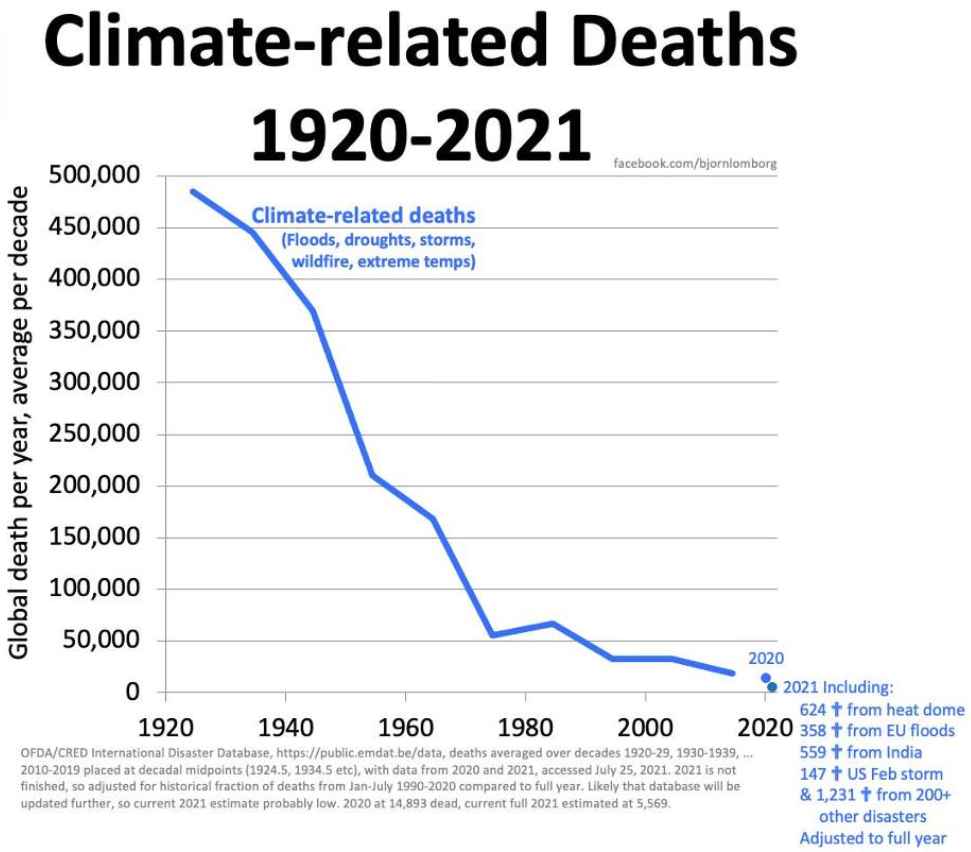
The reason why these deaths are declining is because of improvements and expanded access to emergency services, infrastructure, electricity, indoor climate control, and other developments—all of which come thanks to our continued and expanded use of fossil fuels and the myriad products they are integral components of, as discussed in Climate Realism posts here, here, and here, for example.
This brings us to Pope Francis’ criticisms of the Western lifestyle and heavy energy and fossil fuel use.
There is one part of the encyclical that makes an interesting point, that industrial projects that will contribute to local pollution are sometimes undertaken in an area only after the local residents are fed marketing ploys, promises, and “false information.” People are promised economic benefits, Francis writes:
Yet in reality there does not seem to be any true interest in the future of these people, since they are not clearly told that the project will result in the clearing of their lands, a decline in the quality of their lives, a desolate and less habitable landscape lacking in life, the joy of community and hope for the future; in addition to the global damage that eventually compromises many other people as well.
This precise scenario applies to the peddlers of so-called “green energy” much more than to fossil fuel development, at least outside of countries where corrupt governments claim ownership and control development of fossil fuels, doling out the benefits to their unscrupulous regimes and their crony allies while denying local people property rights in resources. An “energy transition” will require tons of land to be cleared for growing biofuel feedstock, placing solar panels and battery storage installations, and wind power plants. Not to mention the mining required to provide the minerals for those technologies, mining often carried out under inhumane conditions using child and slave labor. In addition, Francis has seemingly not considered the land and resources still required to backup “renewable” power sources, which all have larger environmental footprints than traditional energy sources, even including the mining or drilling involved.
The human cost is expansive as well; fossil fuels have provided the transportation fuel as well as materials for infrastructure that make modern life possible, and are contributing to lifting Earth’s poor out of penury. Green energy, on the other hand, greatly expands the need for rare earth minerals and materials like cobalt, the mining of which famously involves the abuse of children and slave labor. Francis may be ignorant of the fate of those forced into working in the green energy supply chain, but if he is aware, he should have factored these issues into his statements
The solution presented by Pope Francis is, in practice, nothing more nor less than a “degrowth” agenda, and though he insists that the world’s poor need to be considered, the world’s governments, the World Economic Forum, and international banking structures, evince no real concern for helping the world’s poor by pushing these retrograde “net zero” policies. On the contrary, the international green agenda has so far resulted in more poverty and, as in the case of in the case of Sri Lanka, famine and violence.
The Pope gets two things right in Laudate Deum: human beings should be good stewards of the environment; and humans and our activities are not an inherent danger to the planet. Population control, the Pope argues, is not a reasonable solution to environmental problems. This is correct, and it is notable that the media did not report on this part of the encyclical. Unfortunately, Francis is seemingly oblivious to the fact that the activists who have influenced his perspective and with whom he is working on climate change, reject this view. Instead, they argue current human populations are too large and unsustainable. On their view, a much smaller population is needed to save the planet, and, as a result, they embrace and encourage harsh population control policies, that one guesses, from his statement, the Pope would find inimical Catholic doctrine.
If climate change was in fact catastrophic, or endangering the planet and human life, Francis’ concerns would be warranted, although the solutions he proposes would still be unjustified. Fortunately, evidence undermines those concerns. Francis would be better served by more moderate advisors on science and economics. Science and economics do inform normative choices, both morally and politically. Because of that it is vitally important that all the facts are known, especially when the prescribed cures for climate change are so far reaching, wrenching, and dangerous to human life.
- Linnea Lueken
Photo of Pope Francis: Creative Commons Attribution 2.0 | Wikipedia
Get your Copy at Amazon TODAY!
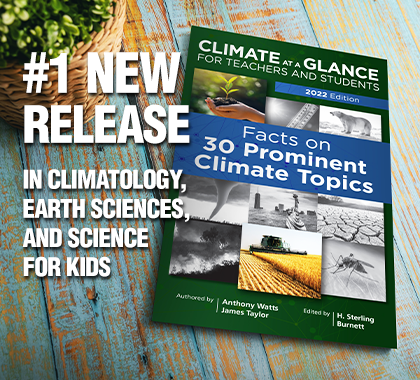
Podcast of the Week
Think wind, solar, and batteries can replace the hydrocarbon fuels that power our modern industrialized society? Green Breakdown shows why the Net Zero agenda―a forced transition to renewable energy―is costly, dangerous, and destined for failure. Using science, economics, and in-depth analysis, author Steve Goreham exposes the weaknesses in the planned green energy transition and predicts a coming renewable energy failure.
Join our host, Anthony Watts, and weekly panelists, Dr. Sterling Burnett and Linnea Lueken, and author Steve Goreham as we look at the pitfalls.
Subscribe to the Environment & Climate News podcast on Apple Podcasts, iHeart, Spotify or wherever you get your podcasts. And be sure to leave a positive review!
Cities’ Summer Temperatures Inflated Due to Urban Heat Island

Roy Spencer, Ph.D, a principal research scientist at the University of Alabama in Huntsville, and his colleagues are finishing the development of a new methodology for measuring the Urban Heat Island (UHI) effect as a function of population density. For the purpose of a forthcoming paper, Spencer and his colleagues applied the new methodology to summer temperature data sets from 1895 through 1923, because that is the season when they expect the UHI to introduce the greatest amount of bias. They are using thousands of closely-spaced temperature station pairs to compute how temperature between stations change with population density at the scale of 10 kilometers by 10 kilometers square.
It has long been clear that there is a strong urban warming signal in the homogenized data used by the National Oceanic and Atmospheric Administration and other government and governments’ agencies, meaning the UHI biases homogenized temperature records, a problem that has grown worse as urban areas have expanded over the past 130 years. Spencer, et al.,’s, methodology is intended to objectively tease out or separate the temperature bias introduced by population densify leaving a more pristine temperature record.
Preliminary data from the new methodology indicates that even for the Global Historical Climatology Network (Version 4), dominated by rural stations, the UHI influence accounts for 24 percent of the measured summer warming trend for 1895 through 2023. However, most data sets used and reported by governments are not dominated by rural stations. This is important because, Spencer and his team found that for the average “suburban” (100-1,000 persons per sq. km) stations, the UHI accounts for 52 percent of the measured temperature trend, and 67 percent of the urban station trend (>1,000 persons per sq. km).
“This means warming has been exaggerated by at least a factor of 2 (100 percent),” reports Spencer, continuing, “[t]his also means that media reports of record high temperatures in cities must be considered suspect, since essentially all those cities have grown substantially over the last 100+ years, and so has their urban heat island.”
Source: Dr. Roy Spencer
Heartland’s Must-read Climate Sites



Video of the Week
We look at agriculture, which seems to be constantly under attack as either being a contributor to climate change, or will suffer from predicted climate change catastrophic effects. But, the reality is far different. Despite a modest warming over the past century, agricultural yields continue to grow, setting several new record highs in the past decade. Further, despite media claims of effects from drought and heatwaves, crops continue to flourish.
Watch our host, Anthony Watts, and weekly panelists, Dr. Sterling Burnett and Linnea Lueken as we take a hard look at the real-world data, as well as discuss the “Crazy Climate News of the Week.”
Tune in every Friday at 1 p.m. ET to watch the Climate Change Roundtable LIVE on The Heartland Institute’s YouTube Channel, and also on Rumble.


